“The wind blows where it wishes, and you hear the sound of it, but you do not know where it is coming from and where it is going; so is everyone who has been born of the Spirit.”
Gospel of John 3:8 – Jesus Christ teaching on the Holy Spirit
Introducing the Third Person of the Trinity:
Acts 1:
Luke tells us that his first book, the Gospel, was about Jesus Christ and that this second account, Acts, will be about what Jesus accomplished through the Apostles AFTER His ascension into heaven.
We look for the actors (so to speak) who Luke records doing the crucial early works of the Church. Peter immediately comes to mind as well as Paul.
What most Christians may have missed in Luke’s chronicles of the first three decades of Church history is that mysterious Person we first met in the Gospels, the ungraspable Image of God in the Holy Spirit.
Luke tells us that during forty days after His resurrection Jesus appeared to many (in addition to the Apostles).
4 Gathering them together, He commanded them not to leave Jerusalem, but to wait for what the Father had promised, …
Here, mentioning the Father and the Person of the Son, Luke records the words of Jesus to the Apostles as they must have testified to our author of Acts:
“Which,” He said, “you heard of from Me; for John baptized with water,
but you will be baptized with the Holy Spirit not many days from now.”
Acts 1:4b NASB
Baptism
And I remind us that baptism [baptizō] ‘produces a permanent change.‘
The Apostles and others are about to be overwhelmed by a permanent change of the Spirit, a baptism receiving the third Person of God, the Holy Spirit. Luke records this cleansing baptism like no other, more that a baptism of water for repentance only.
Ascension of the Lord Jesus
The palpable tension of the Apostle’s encounters with the risen Christ, their beloved friend and Master which concluded Luke’s Gospel now builds once again. Luke records what happens next with this risen Jesus (who they could touch, who shared bread and wine with the Eleven), even the same Jesus who now continued to teach them more for the past forty days.
Christ Jesus again establishes the providence and authority of the Person of God the Father.
He said to them, “It is not for you to know times or periods that the Father has set by his own authority.
Acts 1:7 CSB
but you will receive power when the Holy Spirit has come upon you; and you shall be My witnesses G3144 ..
Acts of the Apostles 1:8a NASB20
μάρτυς – Witness – (to the ACTS which Luke is about to unfold)
- martys [gk.] [Strong’s 3144] Definition:
- a witness
- in a legal sense
- an historical sense
- one who is a spectator of anything, e.g. of a contest
- in an ethical sense
- those who after his example have proved the strength and genuineness of their faith in Christ by undergoing a violent death
Luke is witness through the Apostles not only of the Ascension of Jesus Christ, but a convincing witness to the Holy Spirit as Luke records God’s great acts of power only possible by the Holy Spirit of Almighty God.
Roger@talkofJESUS.com
Jesus was taken up as the Apostles watched!
Luke records that this Son of Man, risen in flesh and blood from the grave, had been with them — forty days — and then powerfully and mysteriously Jesus rises into the clouds as they look on (actually, up) in awe!
The Holy Ghost – In AWE of the Spirit!
How would your have reacted to this powerful, yet unexplainable rising of the Lord Jesus into the clouds?
You may find Luke’s account from the King James Version of the Bible helpful in describing your FEAR and AWE of this historical event which also includes angels of God.
The Holy Ghost in Acts – KJV
The former treatise have I made, O Theophilus, of all that Jesus began both to do and teach, Until the day in which he was taken up, after that he through the Holy Ghost had given commandments unto the apostles whom he had chosen:
To whom also he shewed himself alive after his passion by many infallible proofs, being seen of them forty days, and speaking of the things pertaining to the kingdom of God:
And, being assembled together with them, commanded them that they should not depart from Jerusalem, but wait for the promise of the Father, which, saith he, ye have heard of me.
Luke records what fear and expectation Jesus planted in their hearts prior to the Lord’s ascension. Jesus compares this power with what they had received from John the Baptist.
For John truly baptized with water; but ye shall be baptized with the Holy Ghost not many days hence.
Acts 1:5 KJV – Jesus promising the Apostles a baptism of the Spirit of God (the Holy Ghost)
ἁγίου πνεύματος – hagios pneuma – the Holy Ghost
Unless you have a question for me by way of comment, we cannot get into some of the more mysterious depths of discussion about that which we cannot see and understand even less, the Person of the Holy Ghost. For to speak of the Spirit yields little fruit in the hearts of those ‘christians’ who have not yet received the Holy Spirit.
So allow me to define BOTH GREEK WORDS and you can take it from there.
hagios – HOLY
- from ἅγος hágos (an awful thing) (compare G53, G2282); sacred (physically, pure, morally blameless or religious, ceremonially, consecrated):—(most) holy (one, thing), saint.

(May I just add that our imagery of the Holy Spirit descending sometimes obscures the awesome power of the third Person of the Trinity, that is, the Holy Ghost.) READ just some of these definitions from Strong's G4151 for Pneuma below:
Outline of Biblical Usage
- the third person of the triune God, the Holy Spirit, coequal, coeternal with the Father and the Son
- sometimes referred to in a way which emphasises his personality and character (the “Holy” Spirit)
- sometimes referred to in a way which emphasises his work and power (the Spirit of “Truth”)
- never referred to as a depersonalised force
- the spirit, i.e. the vital principal by which the body is animated
- the rational spirit, the power by which the human being feels, thinks, decides
- the soul
- a spirit, i.e. a simple essence, devoid of all or at least all grosser matter, and possessed of the power of knowing, desiring, deciding, and acting
- a life giving spirit
- a human soul that has left the body
- a spirit higher than man but lower than God, i.e. an angel
- used of demons, or evil spirits, who were conceived as inhabiting the bodies of men
- the spiritual nature of Christ, higher than the highest angels and equal to God, the divine nature of Christ
- the disposition or influence which fills and governs the soul of any one
- the efficient source of any power, affection, emotion, desire, etc.
- a movement of air (a gentle blast)
- of the wind, hence the wind itself
- breath of nostrils or mouth
ACTS in the Spirit
Luke will have much more to say about this mysterious Person of the Trinity and crucial character in his historical account of Acts.
- And when they had prayed, the place was shaken where they were assembled together; and they were all filled with the Holy Ghost, and they spake the word of God with boldness.
- Acts 4:31
And we are his witnesses of these things; and so is also the Holy Ghost, whom God hath given to them that obey him.
Acts 5:32
- And God, which knoweth the hearts, bare them witness, giving them the Holy Ghost, even as he did unto us
- Acts 15:8
- And when Paul had laid his hands upon them, the Holy Ghost came on them; and they spake with tongues, and prophesied.
- Acts 19:6
Although contemporary ‘christianity‘ characterizes the Holy Ghost less fearfully, in order to see his emphasis on the Person of the Holy Spirit let’s close Luke’s AWE–filled [awesome] introduction to ACTS from the KJV:
- Then Peter said unto them, Repent, and be baptized every one of you in the name of Jesus Christ for the remission of sins, and ye shall receive the gift of the Holy Ghost. – Acts 2:38

to be continued..
Comment on Scripture – Share the Gospel


Leave a Reply